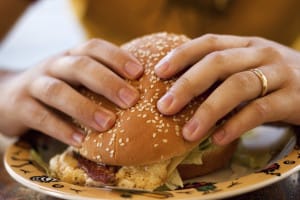Eating disorders alone are serious illnesses, but when they co-occur with substance abuse, the stakes are raised even higher. Research tells us that close to half of the people struggling with an eating disorder are also abusing substances. This is a rate of substance abuse that is about five times higher than in the general population. The consequences of having both conditions can be devastating and include poor mental and physical health and can even result in fatalities. If you know someone with an eating disorder whom you also suspect of abusing drugs or alcohol, reach out and offer help.
The Facts About Eating Disorders and Substance Abuse
Young women are most at risk for having an eating disorder, which could include anorexia nervosa, bulimia nervosa, binge eating disorder or an eating disorder not otherwise specified. Young girls who diet regularly are more likely to smoke cigarettes, probably because they believe it will help them lose weight. Girls with symptoms of eating disorders are four times more likely than their peers to try cocaine and inhalants. Over 12 percent of young women take diet pills or other drugs to try to lose weight. Hispanic girls, in particular, are most likely to abuse laxatives to lose weight.
Which Comes First?
There is no clear answer as to which issue a person will develop first, an eating disorder or substance abuse. It can happen either way. A typical path occurs when a young women has a desire to lose weight but may not yet have symptoms of an eating disorder. She experiments with substance abuse and finds that it suppresses her appetite or helps her to purge, and this leads to weight loss and then an eating disorder. Substance abuse may also be a way that a person with an eating disorder copes with negative feelings. For instance, when a young girl feels bad about her body, has low self-esteem or feels pressure from others to be thinner, she may cope by turning to drugs or alcohol. This is a common way that many people struggling with any kind of mental health issue self-medicate. It may be alcohol, an illegal drug or even a prescription or over-the-counter drug that gives someone the ability to escape and cope.
Helping Someone With Substance Abuse and an Eating Disorder
If you suspect that someone is struggling with either or both of these issues, helping her get professional treatment is essential. There are some experts who believe that tackling the substance abuse problem is most immediately necessary, but research tells us that the best strategy with a dual diagnosis is to treat both issues at the same time. To really help someone with both an eating disorder and a substance abuse problem, both problems must be addressed. Diagnosing for other mental illnesses is also crucial. Depression, anxiety and other disorders are common in people with eating disorders and in people with substance use disorders. To help the person you care about, make sure you screen professional treatment programs carefully and find one that adheres to the philosophy of treating the whole person. You should look for a program or for individual professionals whose expertise includes mental health, eating disorders and substance abuse. It is only when someone gets the best professional help that she can begin to heal and learn to accept herself as she is and cope with negative emotions in healthful and positive ways.

